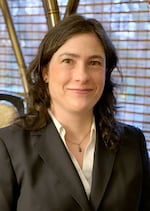Oregon’s Public Defense Services Commission decided Thursday it would move to hire Jessica Kampfe as executive director of the Office of Public Defense Services, the state agency responsible for providing attorneys for those charged with crimes who cannot afford them.
Kampfe currently runs Multnomah Defenders Inc., a public defense nonprofit in Portland and has more than 15 years either as a public defender or running nonprofit indigent defense firms in Marion, Washington and Multnomah Counties.
“I plan to accept the job,” Kampfe told OPB late Thursday. “Right now is a really challenging time for public defense and the provider community.”

Jessica Kampfe is poised to become the new executive director of Oregon's Office of Public Defense Services after the Public Defense Services Commission voted to offer her the job on Thursday. Kampfe, a longtime public defense leader, takes over an agency in crisis.
Courtesy of Multnomah Defenders Inc. / OPB
Indeed, Kampfe will inherit a state agency that’s currently left hundreds of people without constitutionally-required legal support. On any given day, that includes dozens of people in custody.
While the shortage of public defenders is the most acute crisis, the agency has struggled for years. In 2019, a report conducted by the nonpartisan Sixth Amendment Center found Oregon’s public defense system was so bureaucratic and structurally flawed that the state couldn’t guarantee clients were getting the criminal defense they’re entitled to. While some things have changed, many of the report’s key findings and recommendations have been left untouched.
State lawmakers and the judiciary are revisiting the report as the public defense system has faltered and has now grown into a full-blown crisis.
“The folks that we serve really need a strong leader who knows public defense well and who can communicate the values that we hold and the challenges that we face to people in power so that we can get the resources that we need to serve our clients,” Kampfe said. “I think I can do that effectively.”
Kampfe was one of two finalists for the executive director position, which she said she understood to be a two-year position.
Craig Prins, Inspector General with the Oregon Department of Corrections, also interviewed with the public defense commission. Some public defense providers lobbied the commission against choosing Prins, arguing his professional background in corrections and as a prosecutor was ill-suited. Others suggested the agency should hire both to complement one another.
Prins’ background in state government is something Kampfe acknowledges she lacks and said she will need to surround herself with people who can help “fill in those gaps for me.” Kampfe said she was “very open” to working with anyone who can help.
In August, the public defense commission voted to fire Stephen Singer after just eight months as executive director of OPDS. On Wednesday, Singer filed a $2.4 million lawsuit arguing his firing violated state law.
Oregon’s public defense system is made up of a largely part-time, contracted workforce. At the trial level, no public defenders are state employees. Often, there have been divisions between public defense nonprofits and consortia, private firms made up of groups of attorneys. At times their policy and political goals are so different that each faction has its own lobbyist.
“The public defense community needs to be unified and [the Office of Public Defense Services] needs to be a strong leader in unifying that community,” Kampfe said, noting divisions cannot deepen.
“It absolutely has to change,” she said. “If we’re not all in this together we’re not going to be successful.”
